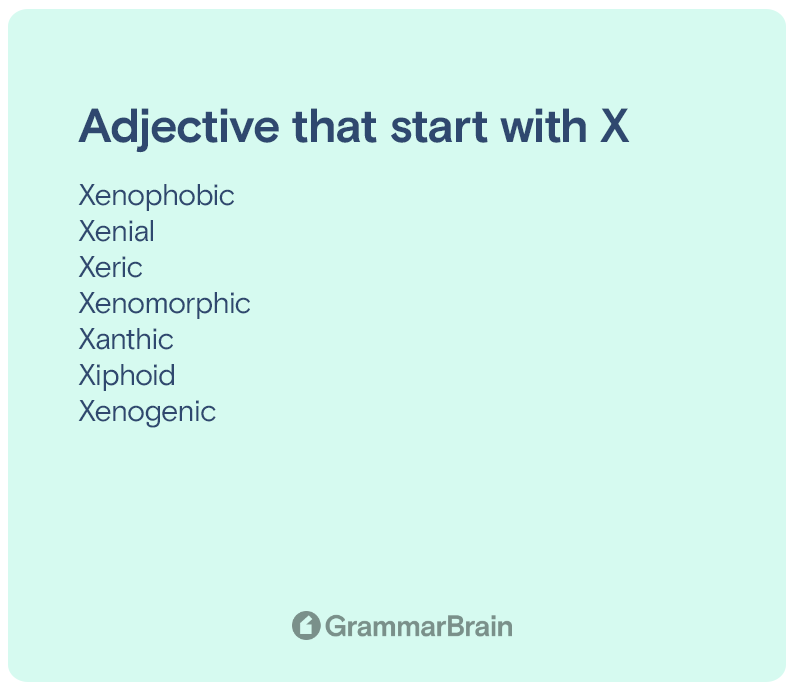Looking for a list of adjectives that start with X? You’ve come to the right place! This blog post will provide you with a comprehensive list of adjectives that begin with the letter X. So whether you are looking for quirky adjectives or descriptive words, you’ll find what you need here. Keep reading to get started!
List of adjectives that start with X
Adjectives that start with X are some of the most interesting terms in English. You can use them to describe people, places, things, or ideas, and add a lot of personality to writing. If you’re looking for a list of adjectives that start with X, you’ve come to the right place.

Here are some great examples of adjectives that start with X:
1) Xenophobic
A xenophobic person has a fear or dislike of people from other countries. This can be manifested in many ways, such as avoidance of contact with foreigners, and suspicion or hatred of their customs.
Xenophobia is often rooted in ignorance or misunderstanding of other cultures and can be exacerbated by economic insecurity or competition for scarce resources. It can also respond to real or perceived threats to one’s way of life.
Xenophobia can lead to discrimination and even violence against those perceived as foreign or different. In extreme cases, it can result in mass deportations or genocide.
2) Xenial
Few people know that the English language actually has a fair number of words that start with the letter X. While some, like “xenial” may be less well-known, others, such as “x-ray” are quite common.
Xenial is an adjective that typically refers to someone who is hospitable or friendly. It can also be used to describe things like weather or climates that are conducive to comfort or happiness.
Given its meaning, it’s not surprising that the word is often used in the hospitality industry. However, it can also be applied more broadly to describe anything from a cozy fireplace to a warm and sunny day. So next time you’re looking for a way to describe something pleasant or inviting, don’t forget about xenial.
3) Xeric
Xeric is an adjective that refers to something that is very dry. This word is often used to describe arid or desert-like conditions. It can also be used to describe plants that are adapted to living in such conditions.
The adjective comes from the Greek word “xeros” which means “dry.” Xeric (adjective): of, relating to, or suited to a dry environment; especially : characterized by sparse rainfall and high evaporation.
The word xeric comes from the Greek word for “dry,” and it’s used to describe things that can thrive in environments with little water. Plants that are xeric are often found in desert regions, where they have adapted to dry conditions.
Xeric plants are often succulents, which means they have thick, fleshy leaves or stems that store water. This helps them survive in their hot, dry habitats.
4) Xenomorphic
Xenomorphic (adj.) refers to something that is strikingly different or unfamiliar in appearance. The word can be used to describe people, animals, objects, and even ideas.
When applied to people, xenomorphic characteristics might include physical features that are outside the norm for one’s culture or ethnicity. For example, a person of Asian descent who is born with blue eyes would be considered xenomorphic. Similarly, a person with albinism would be considered xenomorphic in many cultures where this condition is not common.
Xenomorphism can also refer to behavioral traits perceived as being outside the norm.
5) Xanthic
Xanthic is an adjective used to describe things that are yellow or golden. The word can describe objects, people, animals, and even natural phenomena. The word xanthic is derived from the Greek work Xanthos, which means “yellow.” Xanthic comes from the same root as the word xanthophyll, a type of yellow pigment found in plants.
Xanthic can be used to describe anything that has a yellow or golden color. For example, a xanthic butterfly would have brightly colored yellow wings. A xanthic sunset would be a beautiful golden color.
6) Xiphoid
The xiphoid adjective is a grammatical term used to describe a word that refers to the xiphoid process, a small bone at the base of the sternum. The xiphoid adjective can be used to describe both physical and figurative things.
For example, someone might say, “I have a sharp pain in my xiphoid process” to describe a physical sensation. Alternately, someone might say, “I’m feeling xiphoid today” to describe their emotional state.
The word “xiphoid” is derived from the Greek word “xiphos,” which means “sword.” This is likely because the xiphoid process resembles the shape of a sword. The xiphoid adjective is not very common in everyday English usage, but it is a useful term to know for those studying grammar or medicine.
7) Xenogenic
A xenogenic adjective is a word that describes someone or something from a different culture or country. The adjective can describe physical features, personality traits, or anything else that makes someone or something unique.
Xenogenic adjectives are often used positively to highlight the differences between people and cultures. They can also be used negatively to point out how someone or something is not like the speaker or writer.
Xenogenic adjectives can be used in both written and spoken English. They are commonly found in news articles, books, and other texts that discuss different cultures.
Descriptive adjectives that start with X
Descriptive adjectives are words that modify nouns or pronouns. They can describe feelings, colors, sizes, shapes, times, weather, quantities, and more. Descriptive adjectives that start with X include xanthous, xenial, and xeric.
Finally, xeric refers to an environment that is dry or lacking in water. All of these adjectives can be used to describe various things, depending on the context in which they are used.
Positive adjectives that start with X
Positive adjectives are words that positively describe a person or thing. Positive adjectives that start with X include “xenial,” “xanthic,” and “xenomorphic.” These words all describe things that are pleasant or favorable, making them great choices for writing that seeks to paint a positive picture. Other positive adjectives that begin with X include “extraordinary,” “exuberant,” and “expansive.”
These terms can describe people, places, things, or ideas that are especially appealing or exciting. As with all adjectives, it’s important to use them carefully. So as not to overdo it and turn your writing into a string of empty superlatives. But when used skillfully, these words can add much power and appeal to your writing.
Negative adjectives start with X
Negative adjectives are words that describe someone or something in a negative way. There are many negative adjectives that start with X, including:
- Xenophobic: having a fear or dislike of people from other countries
- Xenophobic: having a fear or dislike of anything strange or foreign
- Xenophobic: feeling anxious or threatened by anything unknown or different
If you want to describe someone afraid of foreigners or anything different, you can use the adjective xenophobic. If you want to describe someone as unfriendly or uncooperative, you can use the adjective uncooperative. And if you want to describe something unpleasant or unwanted, you can use the adjective unpleasant.
Adjectives that start with X to describe a person
Adjectives are words that describe or modify another person or thing in a sentence. To form an adjective, we often add suffixes to verbs or nouns, such as -able, -ous, ed, and ing. However, some adjectives don’t follow this rule and instead start with a specific letter. Here is a list of adjectives that start with X to describe a person.
- Xenodochial: friendly to strangers
- Xanthous: having a yellow complexion
- Xenophobic: having a fear or hatred of foreigners or strangers
- Xerophilic: attracted to dry conditions
- Xenogenetic: relating to the transfer of genes between different species
Example sentences of adjectives that start with X
Adjectives that start with X are often used to describe people or things. Here are some examples of sentences using adjectives that start with X:
- Xenophobic people are afraid of foreigners.
- The xylophone is a musical instrument made of wooden bars.
- My little sister is very xenial. She loves making new friends.
- I need to buy some new clothes; all of mine are getting a bit shabby.
- I can’t believe he said that! It was so rude and tactless!
- I’m going to bed; I’m exhausted from today.
Overall, X is a great letter to start off adjectives with because it’s unique and interesting. It’s the first letter of the alphabet, which gives it an extra special quality. When you use adjectives that start with X, your writing will be more memorable and attention-grabbing.
Other adjective lists
Other lists of adjectives:
- Adjectives that start with A
- Adjectives that start with B
- Adjectives that start with C
- Adjectives that start with D
- Adjectives that start with E
- Adjectives that start with F
- Adjectives that start with G
- Adjectives that start with H
- Adjectives that start with I
- Adjectives that start with J
- Adjectives that start with K
- Adjectives that start with L
- Adjectives that start with M
- Adjectives that start with N
- Adjectives that start with O
- Adjectives that start with P
- Adjectives that start with Q
- Adjectives that start with R
- Adjectives that start with S
- Adjectives that start with T
- Adjectives that start with U
- Adjectives that start with V
- Adjectives that start with W
- Adjectives that start with X
- Adjectives that start with Y
- Adjectives that start with Z
Inside this article
Fact checked:
Content is rigorously reviewed by a team of qualified and experienced fact checkers. Fact checkers review articles for factual accuracy, relevance, and timeliness. Learn more.
Core lessons
Glossary
- Abstract Noun
- Accusative Case
- Anecdote
- Antonym
- Active Sentence
- Adverb
- Adjective
- Allegory
- Alliteration
- Adjective Clause
- Adjective Phrase
- Ampersand
- Anastrophe
- Adverbial Clause
- Appositive Phrase
- Clause
- Compound Adjective
- Complex Sentence
- Compound Words
- Compound Predicate
- Common Noun
- Comparative Adjective
- Comparative and Superlative
- Compound Noun
- Compound Subject
- Compound Sentence
- Copular Verb
- Collective Noun
- Colloquialism
- Conciseness
- Consonance
- Conditional
- Concrete Noun
- Conjunction
- Conjugation
- Conditional Sentence
- Comma Splice
- Correlative Conjunction
- Coordinating Conjunction
- Coordinate Adjective
- Cumulative Adjective
- Dative Case
- Determiner
- Declarative Sentence
- Declarative Statement
- Direct Object Pronoun
- Direct Object
- Diction
- Diphthong
- Dangling Modifier
- Demonstrative Pronoun
- Demonstrative Adjective
- Direct Characterization
- Definite Article
- Doublespeak
- False Dilemma Fallacy
- Future Perfect Progressive
- Future Simple
- Future Perfect Continuous
- Future Perfect
- First Conditional
- Irregular Adjective
- Irregular Verb
- Imperative Sentence
- Indefinite Article
- Intransitive Verb
- Introductory Phrase
- Indefinite Pronoun
- Indirect Characterization
- Interrogative Sentence
- Intensive Pronoun
- Inanimate Object
- Indefinite Tense
- Infinitive Phrase
- Interjection
- Intensifier
- Infinitive
- Indicative Mood
- Participle
- Parallelism
- Prepositional Phrase
- Past Simple Tense
- Past Continuous Tense
- Past Perfect Tense
- Past Progressive Tense
- Present Simple Tense
- Present Perfect Tense
- Personal Pronoun
- Personification
- Persuasive Writing
- Parallel Structure
- Phrasal Verb
- Predicate Adjective
- Predicate Nominative
- Phonetic Language
- Plural Noun
- Punctuation
- Punctuation Marks
- Preposition
- Preposition of Place
- Parts of Speech
- Possessive Adjective
- Possessive Determiner
- Possessive Case
- Possessive Noun
- Proper Adjective
- Proper Noun
- Present Participle
- Prefix
- Predicate



